
Baba Ramdev-founded Patanjali Ayurved Ltd. has become India's second biggest consumer goods maker behind Hindustan Unilever Ltd., riding on the success of its lower-priced ayurvedic products.
The company reported higher sales than rivals like ITC Ltd. (FMCG segment) and Godrej Consumer Products Ltd. in the year ended March. The growth was driven by key products like cow's ghee, toothpaste and herbal soaps and shampoos. The company expanded into newer categories, taking its yearly revenue to Rs 10,561 crore.
Patanjali has positioned itself in the entire FMCG space as “very Indian and rural-oriented”, said Dhanraj Bhagat, retail partner at consultancy Grant Thornton India LLP. Competitive prices make its products immensely popular, he said.
Its revenue grew at a faster pace even though its distribution reach is nearly a fifth of the average of its rivals'. The company sells its products through 250 mega stores, 5,000 Patanjali Chikitsalaya and Patanjali Arogya Kendra outlets, one million retail stores, modern trade and online retailers, according to SK Tijarawala, spokesperson of Patanjali Ayurved.
Ajay Thakur, research analyst at Anand Rathi Securities, pegged HUL's distribution reach at 5.6 million outlets, ITC's at 4.5 million, Dabur's at 5 million, Colgate Palmolive's at 5 million outlets, and Marico's at 4-4.5 million outlets.
.png)
Rivals added ayurvedic or herbal products to their portfolio to tap the demand created by the maker of Dantakanti toothpaste and Patanjali desi cow's ghee, the largest contributor to its revenue. Here are Patanjali's top five products and how it compares with rivals…
Cow's Ghee
Patanjali earned a revenue of Rs 1,467 crore from cow's ghee, a fragmented market with several unorganised players. In the organised branded ghee market, Patanjali is a direct rival to Amul. Branded ghee accounts for about 44 percent of volumes in the overall market, according to market researcher Kantar Worldpanel.
Patanjali is the only brand that seems to have a good presence across zones, Kantar Worldpanel said. It has the highest volume share, followed by Amul, Krishna, Milma, Nandini and BRB, Kantar said. Patanjali and Amul are at nearly the same level in terms of penetration, it said.
Patanjali positioned its ghee in the premium segment and it was well accepted by consumers, said Sachin Bobade, senior research analyst at brokerage Dolat Capital.
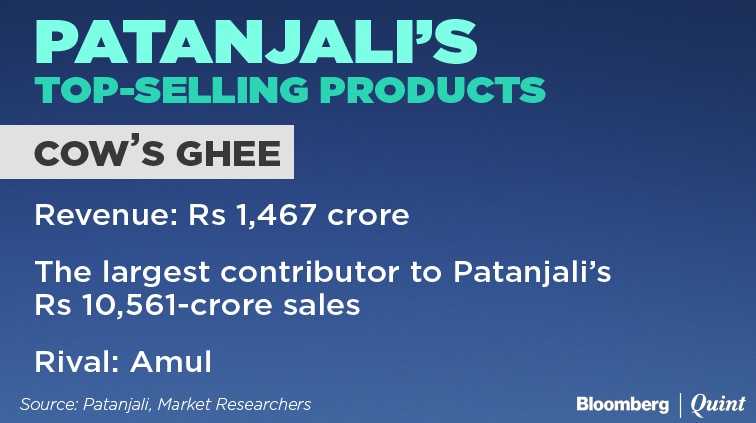
Toothpaste
The maker of Dantkanti toothpaste earned a revenue of Rs 940 crore from the segment. The company said its share in market stood at 14 percent at the end of March.
Rivals include market leader Colgate Palmolive India Ltd. and Dabur India Ltd. Colgate Palmolive saw its share fall to 55.6 percent in 2016 compared to 57.4 percent in the previous year, according to its investor presentation. Toothpaste contributes to more than three-fourths of the company's Rs 4,490 crore sales, according to Bobade.
Dabur India, maker of Dabur Red and Meswak brands, said in its earnings conference call that its share in the herbal and ayurvedic toothpaste market rose 1 percentage point in the year ended March amid consumers' growing preference for such products.
Both Colgate Palmolive and Dabur India did not comment on their strategy to counter Patanjali's challenge.
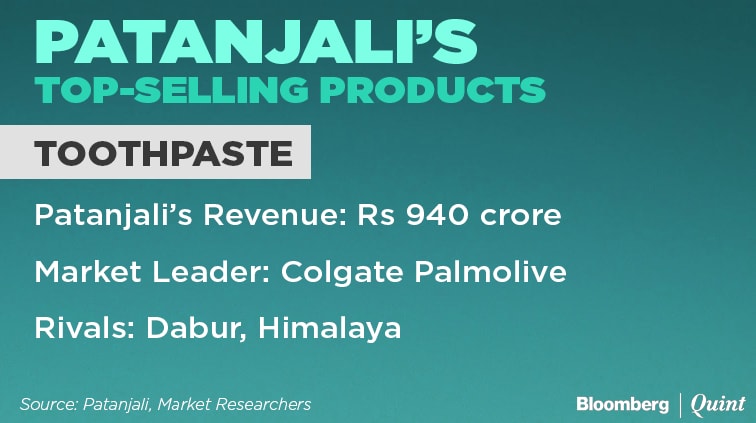
Ayurvedic Medicines
Patanjali earned Rs 870 crore revenue from ayurvedic medicines, nearly four times compared to its direct rival Dabur India.
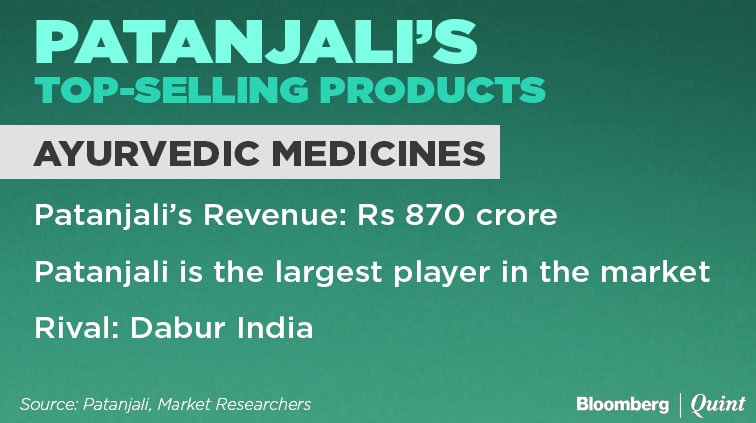
Shampoos
Keshkanti shampoo contributed a revenue of Rs 825 crore for Patanjali.
Patanjali has captured the lower end of the market but has not been able to penetrate the premium market, said Prashant Agarwal, joint managing director of Wazir Advisors, a retail and brand consultancy firm.
Hindustan Unilever is the market leader with a 45 percent share in shampoos. India's largest consumer goods maker earned Rs 16,304 crore from the personal care segment, which includes shampoo and soap brands like Dove, Sunsilk, Tresemme and Lux, and skincare products like Fair & Lovely and Ponds cream.
HUL said its ‘naturals' segment in personal care is growing fast, tracking the trend in several parts of the world. The Anglo-Dutch consumer goods maker relaunched its Lever Ayush brand and also acquired Indulekha, a premium hair care brand. HUL also launched Tresseme Botanique, Fair & Lovely Ayurveda, Clinic Plus Ayurveda Care and Citra – a specialist naturals brand.
Patanjali's other rivals in the shampoo segment include Proctor & Gamble's Head & Shoulders and Pantene, and L'Oreal's Garnier and L'Oreal range.
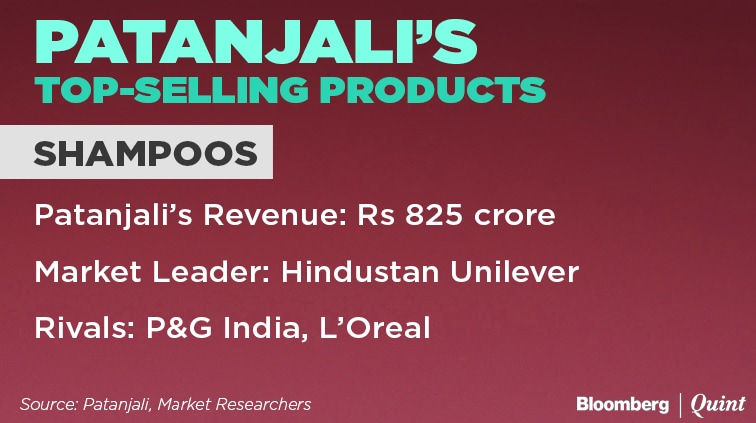
Soaps
Patanjali's herbal soap segment mopped up a revenue of Rs 574 crore. Other than toothpaste and shampoo, Patanjali has not challenged existing players in the rest of the personal care market as its other products have not yet been able to gain acceptance, Agarwal said.
HUL, the maker of Lifebuoy, is the market leader in soaps, followed by rivals like Nirma, Godrej Consumer Products and ITC.
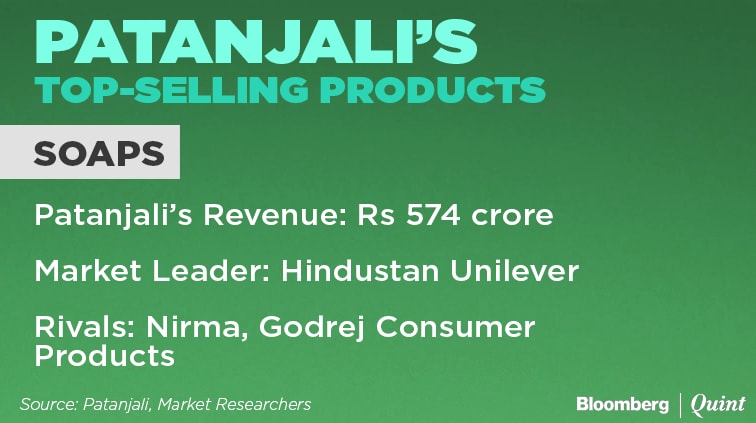
Patanjali also makes other food and non-food consumer goods like mustard oil, flour, biscuits, honey, washing powder, aloe vera juice, aloe vera gel, skincare, chyawanprash and health drinks.
The Baba Ramdev-backed company said it has a 50 percent market share in the honey and is the market leader in the raw ghani mustard oil segment.
Essential Business Intelligence, Continuous LIVE TV, Sharp Market Insights, Practical Personal Finance Advice and Latest Stories — On NDTV Profit.





















